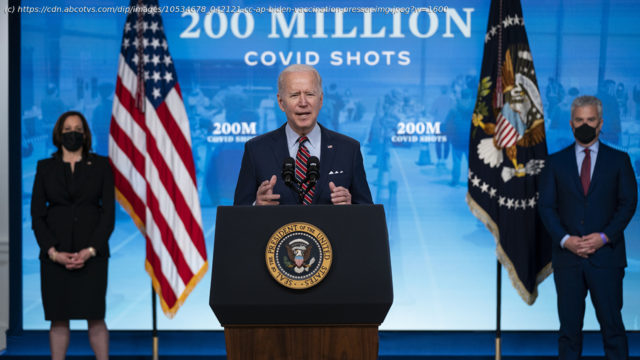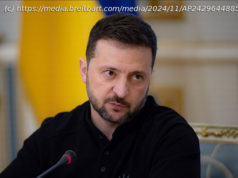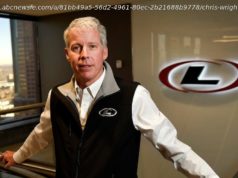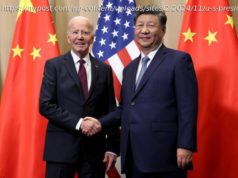Here’s a look at how President Joe Biden is measuring up in meeting some of the markers he laid out for the start of his presidency.
WASHINGTON — When President Joe Biden took his oath over three months ago, he assumed responsibility for a set of unprecedented challenges ranging from a global pandemic, an economic crisis and a nation reeling from political and racial divisions. As a candidate and incoming president, he had promised a series of swift and sweeping actions to address the range of challenges he inherited. As he now approaches his 100th day in office on Thursday, here’s a look at how Biden is measuring up in meeting some of the markers he laid out for the start of his presidency.“It’s a matter of timing,“ Biden told reporters last month, explaining his approach to governing. „As you’ve all observed, successful presidents — better than me — have been successful, in large part, because they know how to time what they’re doing — order it, decide and prioritize what needs to be done.“Throughout 2020, Biden laid out his vision for combatting the COVID-19 pandemic and helping Americans emerge from the economic crisis. Once taking office, he formally unveiled a relief package he called the „American Rescue Plan,“ which became the blueprint for coronavirus relief legislation. Among the promises Biden made on the campaign trail were stimulus checks, funding for schools to implement safety measures and reopen, small business funding, and money for vaccinations, testing, and contact tracing. All of these items were included in the $1.9 trillion package that ultimately became law after Congress passed it and, on March 11, Biden signed into law. But Biden did fail on one pledge: He said he would secure bipartisan support for the measure, but he ultimately failed to persuade a single Republican lawmaker to vote for it. In December, Biden set a goal that 100 million COVID-19 vaccine doses would be administered in his first 100 days in office. But by the time he assumed the presidency, the United States was already administering around a million shots a day on average. And with the effort ramping up, it was clear Biden would very likely achieve his goal early — in large part thanks to actions taken under the previous administration. Pharmaceutical companies began to flood the system with more doses, and a third vaccine gained emergency-use authorization from the Food and Drug Administration. The Biden administration secured hundreds of millions more doses and opened up more vaccination sites, at pharmacies and via mobile vaccination units. The U.S. reached 100 million shots in Biden’s Day 59, and one week later, the president doubled his goal to 200 million shots by his 100th day. On Wednesday, on Day 92, he announced the U.S. had reached that milestone, too — eight days early.“If Congress provides the funding we need to protect students, educators and staff, if states and cities put strong public health measures in place that we all follow,“ Biden said in December, „then my team will work to see that a majority of our schools can be open by the end of my first 100 days.“Since Biden took office, Congress did allocate hundreds of billions of dollars for schools, and many states and cities have adopted health measures in line with newly updated guidance from the Centers for Disease Control and Prevention. But Biden was vague about what he meant by „open“ — whether full time or part time — and the White House has similarly shifted the goalposts. The most recently available survey data from the U.S. Department of Education, released on April 7, found that 46% of public school students were being offered full-time, in-person learning — but that the vast majority were still learning online, at least part of the week. Having the option was not the same as utilizing it: Only 29% of eighth graders and 39% of fourth graders were attending school full-time in-person in February, according to the survey. Biden pledged to sign an executive order on Day One to require masks where he had the legal power to do so, including in „federal buildings“ and during „interstate travel on planes, trains and buses.“He followed through on that promise, signing that order within hours of becoming president. Biden also said he would encourage Americans to wear masks for 100 days and would work with governors and mayors to mandate masks, as well. Biden has done both, repeatedly wearing a face covering himself — unlike his predecessor, former President Donald Trump — and explicitly calling on Americans to do the same. He’s also encouraged state and local mandates, although it’s not clear what type of pressure he’s exerted on governors and mayors to enact them. Biden’s foreign policy platform was predicated on faith in international institutions and the strength of multilateralism. To that end, he promised to reverse what he saw as the retreat from the global stage that took place under Trump. So, as promised, he ended a process Trump had started — to remove the U.S. from the World Health Organization. And he returned the United States to the Paris climate accord after Trump pulled out. Biden also pledged to return to the Iran nuclear deal, known as the Joint Comprehensive Plan of Action. His administration jump started talks on the matter, but so far has not come to an agreement that would bring both the U.S. and Iran back into compliance. And last week, the White House said Biden’s first trip abroad as president, in June, would take him to the United Kingdom and Belgium for summits with leaders from NATO, the European Union and the „Group of Seven“ industrialized nations. The trip, the White House said, would „highlight his commitment to restoring our alliances, revitalizing the Transatlantic relationship, and working in close cooperation with our allies and multilateral partners to address global challenges and better secure America’s interests.“Returning the United States to the Paris accord on climate change on his first day in office sent a signal the Biden saw climate change as one of the primary crises he said he believed the country faced. It was a stark contrast with his predecessor, Trump, who minimized the importance of climate change and the role of science in general. Biden signed executive actions that elevated the importance of science in federal policymaking and that called on federal agencies to make climate change and environmental justice a priority in domestic and foreign policy decision-making. He created several senior positions and established a prominent Office of Domestic Climate Policy at the White House. Last week, he fulfilled a pledge to bring world leaders together to discuss climate change. He has also blocked the Keystone XL oil pipeline from becoming a reality and stopped drilling in the Arctic National Wildlife Refuge.






